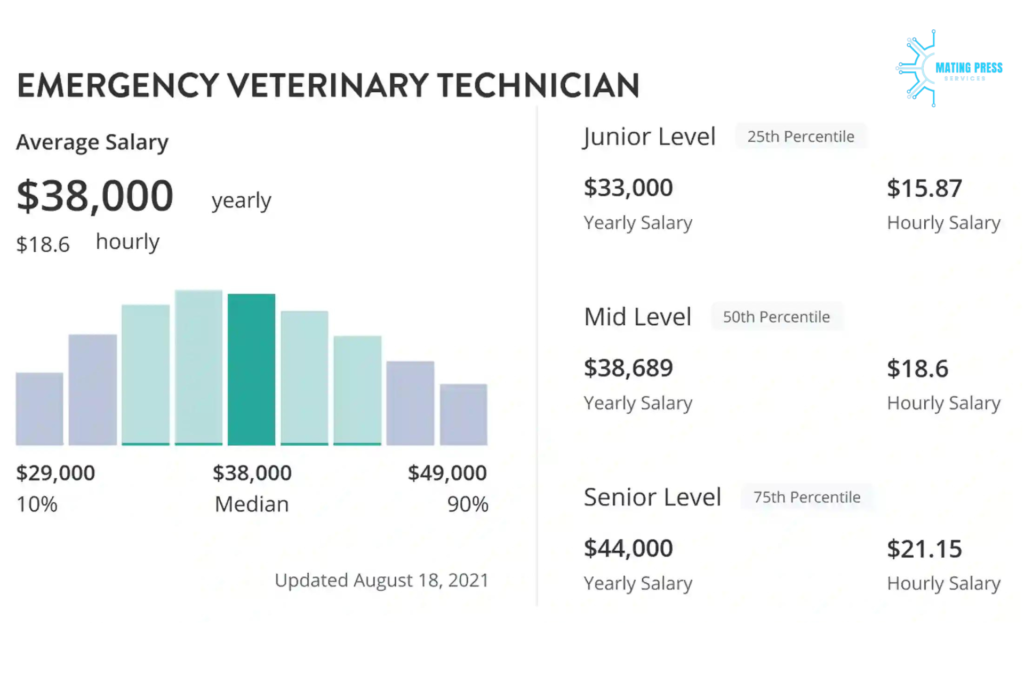ER Tech Hourly Wage

Healthcare could not do without ER Technicians. These professionals, commonly referred to as ER Techs, help medical practitioners in emergency rooms to discharge their duties efficiently. This guide is meant to explain the pay of ER Tech on an hourly basis including; geographical variations, other factors affecting the pay and career opportunities.
What is an ER Tech Hourly?
ER techs are healthcare professionals that work in emergency care settings. They have a wide range of responsibilities like:
- Patient Care: Aiding in simple patient care activities such as taking vital statistics, giving medication and comforting the patient.
- Diagnostic Support: Carrying out diagnostic tests like ECGs’, phlebotomy and specimen collection.
- Operational Support: Ensuring that the emergency room is adequately stocked, clean and ready for patient care.
Average ER Tech Hourly Wage

The average hourly pay for these technicians varies considerably based on certain factors. Data from recent studies show that most of them earn between $17 and $21 per hour. However, this figure may vary depending on where one lives or works, their experience as well as nature of healthcare facility they work for.
Factors Influencing ER Tech Hourly Wage
Location
One of the major determinants of hourly wage received by these technicians is geographical location. Here are some examples:
- California – California-based Technicians generally get higher wages because the state has a high cost of living and demand for health workers. In California any individual working at ER can expect to receive about
$22 – 28 per hour. - Texas – The average hourly wage for an ER technician in Texas is estimated to be at around
$16 – 20 per hour.Though it’s relatively cheaper to live in Texas compared to some states hence lower wages. - Chicago – It should be noted that there are differences even within cities. ER technicians in Chicago can anticipate earning between
$18 – 23 per hourgiven the high cost of living and well-established health system. - New York – Approximately, an average hourly wage for an ER Tech here is about
$20 – $25 per hourin metropolitans.
Experience and Certification
Experience and certification also influence how much these technicians are paid on an hourly basis. Those who have worked longer or possess additional qualifications usually earn more. Such credentials include:
- Basic Life Support (BLS)
- Advanced Cardiovascular Life Support (ACLS)
- Emergency Medical Technician (EMT) Certification
Type of Healthcare Facility
Type of health facility where an ER tech works also affects their pay rate per hour. For example:
- Hospitals: These typically offer higher wages due to the intense nature of the job.
- Urgent Care Centers: Such may have slightly lower salaries as compared to those in hospitals but allow for flexible working hours.
- Private Clinics: On average, these provide good pay with perhaps extra rewards.
Regional Variations in ER Tech Hourly Wages
Where Do ER Tech Hourly Make the Most Money?
ER Technicians earn relatively higher salaries especially when they are working under demanding conditions that demand lots of income to live a comfortable life. Popular states like California, New York and Massachusetts are known to have some of the highest pays for ER techs where someone can make over $25/hr.
What is the hourly income of ER Tech Hourly in California?
In California, there is a high demand for healthcare professionals and this coupled with higher wages. Those working as ER techs in California make anywhere between $22 to $28 per hour with large cities like Los Angeles and San Francisco having some of the highest wages.
How much do ER Tech Hourly Make in Texas?
The amount earned by an ER tech in Texas typically ranges from $16 to $20 per hour, which is relatively moderate. The cities such as Houston and Dallas are usually on the higher end of this wage scale because they have very large health systems.
How Much Do ER Tech Hourly Make in Chicago?
ER Techs in Chicago make approximately $18 to $23 an hour. It has a lot of hospitals and clinics thanks to its vast medical network and high cost of living.
How Much Do ER Tech Hourly Make in New York?
Emergency room technicians situated within New York, especially major towns such as New York City can earn around $20 to $25 per hour. These are above average rates partly due to the lively healthcare industry here as well as a high cost of living.
Comparing ER Tech Hourly Wages Across Different States
Knowing about these differences can help ER techs choose their careers wisely. Below is a comparison of states’ hourly wages for emergency room technicians:
- California: $22 – $28 per hour
- New York: $20 – $25 per hour
- Texas: $16 – $20 per hour
- Florida: $15 – $19 per hour
- Illinois: $18 – $23 per hour
- Massachusetts: $20 – $$26 per hour
- Washington: 19 – 24 dollars an hours
These figures indicate that there are regional discrepancies regarding the salaries of emergency room technicians in various locations, and these may be attributed to factors such as cost of living, demand for healthcare services, or specific state policies.
The Role of Experience in Determining Wages

Entry-Level ER Tech Hourly
With limited experience and possibly fewer certifications, entry-level ER techs usually earn towards the lower end. Their starting salary is between $15 to $18 per hour. Nevertheless, gaining more experience as well as additional certifications can significantly increase their earnings potential.
Mid-Level ER Tech Hourly
A variety of qualifications and several years’ experience can increase the pay scale for ER Techs. Mid-level ER Techs (3-5 years) make about $19 to $23 an hour. These staff members are entrusted with increased responsibilities due to the amount of time they have spent working on the job and knowledge acquired during that period.
Senior ER Tech Hourly
The most experienced emergency medical technician receives a higher pay due to advanced certification. Their salaries range from $24 up to $30 an hour per seniorer physician’s assistant. Such employees normally have considerable experience in this field, which makes them indispensable members of the first aid teams.
Impact of Certifications on ER Tech Wages
Certifications can improve skills and earning potential for people employed as emergency room technicians. The following are some certifications that influence their wages:
Basic Life Support (BLS)
Most times BLS certification will be necessary for individuals working as EMT-B’s. It demonstrates familiarity with basic emergency response including CPR and AED use among other things like it does help in bettering salaries offered by any employers who do not offer professional wage rates.
Advanced Cardiovascular Life Support (ACLS)
ACLS certification is more advanced and covers a broader range of emergency procedures, including the management of cardiac emergencies. An ERTech who has this additional certification is able to obtain higher wages because they can handle situations that are more complicated.
Emergency Medical Technician (EMT) Certification
ER Techs find EMT certification very useful. It offers a comprehensive education in emergency medicine encompassing patient evaluations, trauma care and medical emergencies. ER Techs who are EMT certified often receive higher wages than those without the certification.
Pediatric Advanced Life Support (PALS)
Pals certification concentrates on emergency treatment for pediatrics patients who are critically ill or injured. This particular certificate enables ER Techs to work in specialized units and usually attract better remunerations as they are experts in pediatric emergencies.
Types of Healthcare Facilities and Their Impact on Wages
The kind of healthcare facility where an ER Tech works can make a big difference in what their hourly wage is.It takes different forms such as :
Hospitals
The largest employers of ER techs are hospitals with payments that match labor market forces.Hosptal based er tech pay is going around $18-25 per hour depending on their level of experience and where they live.
Urgent Care Centers
In addition to hospitals, urgent care centers also employ ER techs but at slightly lower wages.Er Tech working within the urgent care setting can take home between $15-$20 per hour, although these facilities offer flexible hours and less stressful conditions.
Private Clinics
While private clinics may provide competitive salaries, there are additional benefits like health insurance coverage and paid time off.Private practice settings normally pay Er tech’s rates that range from $17-$22 hourly. These places tend to have stable work environments which minimize stress levels.
Specialized Emergency Facilities
Certain emergency rooms like pediatric emergencies or trauma centers may give higher salary rates because of the specialty skills required.Typical compensation for an Er tech working in one such facility starts at $20-$28 hourly.
Career Advancement Opportunities for ER Tech Hourly
Continuing Education
In order to keep up in the medical field, continuing education is important for career advancement. ER Techs can gain further certification, attend seminars and go through training that will help them build capacity and earn more money.
Specialization
Working in a specific area of emergency medicine could mean higher salaries and better jobs. Er techs can choose from one or more of the following areas:
- Trauma Care: It focuses on serious injuries and life support management.
- Pediatric Emergency Care: It deals with kids’ emergencies only.
- Cardiac Care: These nurses specialize in treating heart related cases among all other types of emergency cases.
Advancing to Higher Roles
More education and experience allows er techs to move into higher positions. Some common career advancement paths include:
- Registered Nurse: Many ER techs who want to become rns will get their bsn or associate’s degrees in nursing. The pay for this job is significantly higher than for an Er Tech position while being much more intense and demanding at the same time.
- Paramedic: This can be done by er techs if they take additional courses such as emt intermediate classes thus qualifying them to do advanced prehospital care activities including intravenous medications
- Physician Assistant: However, some Er techs eventually become physician assistants thereby earning a better salary while still having the ability of treating people
Job Prospects for ER Tech Hourly
Increase in the need for medical personnel
The demand for health care professionals, such as ER techs is on the increase. The ageing population and rising cases of chronic diseases contribute to the increasing pressure on emergency medical services. This indicates a strong job market for ER Techs as the Bureau of Labor Statistics projects a growth rate of 7% for healthcare support occupations from 2020 through 2030.
Impact of Healthcare Policies
Health care policies and regulations can affect the demand for ER Tech Hourly. However, it is important to note that changes in healthcare coverage and funding may influence how many patients visit an emergency room and thus impact the number of required ER techs.
Technological Advances
Technological advancements within medical devices as well as techniques could also influence necessity pertaining to these practitioners. As emergency departments integrate emerging technologies, there is a higher call for quick thinking technicians who are capable of handling as well maintaining them.
ER Tech Hourly Salary:
Knowing which factors determine an ER Tech Hourly salary helps people in this profession to make informed choices about their future. Location, experience, type/size of hospital or clinic and certification all have significant effects on salaries. There are various parts across America where experienced professionals such as Emergency Room Technicians (ER Tech Hourly) can find enriching employment opportunities with competitive compensation.
ER Tech Job Outlook and Future Wage Trends
The demand for ER technicians is expected to grow over the next decade. As hospitals and clinics continue to expand their emergency care departments, the need for skilled ER techs will rise. Additionally, as the population ages and requires more medical services, emergency healthcare services will be crucial.
This demand is expected to have a positive effect on ER tech wages. According to industry projections, the average hourly wage for ER techs could increase by 5-7% over the next five years, particularly in metropolitan areas where healthcare demand is highest.
Furthermore, those willing to relocate to regions with more job opportunities may find that their wage potential increases as well. ER techs who are open to working in high-demand states like California, Washington, or Florida will find more competitive wages and job security.
Benefits Beyond the Hourly Wage
While the hourly wage is an essential consideration for anyone looking into the ER tech profession, it’s important to remember that the job comes with other benefits. These include:
- Health Insurance: Most full-time ER tech positions offer comprehensive health benefits, including medical, dental, and vision coverage.
- Retirement Plans: Many healthcare facilities provide 401(k) matching or pension plans, helping ER techs secure their financial future.
- Paid Time Off (PTO): Depending on the facility, ER techs can earn generous amounts of paid vacation time, holidays, and sick leave.
- Continuing Education: Many hospitals offer tuition assistance or reimbursement for those pursuing further education, certifications, or training in related fields.
Maximizing Your Earning Potential as an ER Tech
If you’re an ER tech or considering this career, there are several ways to maximize your earnings:
- Pursue Further Education: Adding more certifications or obtaining an associate or bachelor’s degree can increase your wage significantly.
- Gain Experience: The longer you stay in the field, the higher your wages will grow.
- Relocate to High-Demand Areas: If you’re open to moving, consider states or cities where ER techs are in higher demand and wages are competitive.
- Work in Specialized Facilities: Trauma centers and large hospitals generally offer higher pay compared to smaller clinics or general hospitals.
FAQs About ER Tech Hourly Wage
1. What is the average hourly wage for an ER Tech?
The average hourly wage for an ER Tech ranges from $14 to $25 per hour. Factors such as experience, location, certifications, and the type of healthcare facility influence the exact wage.
2. How does geographic location impact ER Tech wages?
ER Tech wages vary by geographic location. States with a higher cost of living, like California or New York, tend to offer higher wages (around $20 to $25 per hour) compared to states with a lower cost of living, where the hourly wage may range from $14 to $17.
3. Do ER Techs with more experience earn higher wages?
Yes, experience plays a significant role in wage determination. Entry-level ER Techs generally start at the lower end of the wage range, while those with 5+ years of experience can command higher wages, sometimes up to $25 per hour or more.
4. Does certification affect an ER Tech’s hourly wage?
Yes, having additional certifications such as Advanced Cardiac Life Support (ACLS) or Basic Life Support (BLS) can increase an ER Tech’s earning potential. Specialized training makes them more valuable to employers, which often results in higher wages.
5. Do ER Techs in trauma centers earn more?
Yes, ER Techs working in trauma centers or large hospitals tend to earn higher wages compared to those working in smaller healthcare facilities. These environments demand more specialized skills and can offer wages on the higher end of the scale.
6. What is the job outlook for ER Techs?
The job outlook for ER Techs is positive, with demand expected to grow over the next decade. As healthcare facilities expand and the population ages, the need for skilled emergency care staff will increase, potentially leading to wage growth.
7. Are there opportunities for ER Techs to advance their careers?
Yes, ER Techs can advance their careers by pursuing further education and certifications. Some may transition into roles such as paramedics, nurses, or other healthcare specialties, which come with higher pay and additional responsibilities.






